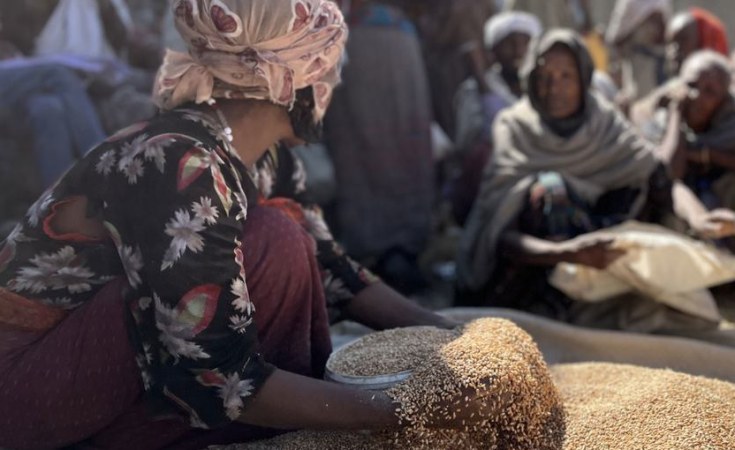Rome — "Healing from the traumas of war, recovery on a human and physical level, building peace, are the salient points on which we are focusing to deal with the devastation and violence that the population of Tigray continues to suffer due to the conflict between the regional government and the federal government of Ethiopia." In a conversation with Fides Agency, the bishop of the Catholic eparchy of Adigrat, Tesfaselassie Medhin, expressed the profound suffering he experiences firsthand in this once lush land, renowned for its thousand-year-old churches among the rocks at 3000 m meters, breathtaking landscapes, and hospitable traditions.
"The population tenaciously resists the most unprecedented suffering, the humiliations, the cruelties and all the limitations of these long years - continues the eparch. Resilience is the best definition to describe this wonderful people who continue to have great respect and gratitude towards the local Church for its commitment towards them".
Since the autumn of 2020, Tigray, a region of Ethiopia bordering Eritrea, Sudan and the neighboring areas of Afar and Amhara, has transformed into a battlefield between the Tigrayan self-defending fighters of the Ethiopian federal army and its allies, in particular the Eritrean forces (see Fides, 3/12/2020).
According to data by the official report of the Tigray Bureau of Education, before the war was unleashed, there were 2,221 primary and 271 secondary/ high schools. More than 1 million students in school and the gross enrolment rate was 90.92%. This includes the Catholic Diocese's 53 educational institutions, ranging from KG up to colleges, with over 16,000 students and 1,115 teachers & support staff.
Currently 88.27% of the schools including 4 Universities are damaged or totally destroyed.
Textbooks, computers, plasma televisions, laboratory equipment, combined desks, black boards, special need education supportive materials were damaged, looted and vandalized. Over two thousand students, teachers and supportive staffs were killed and many more were injured and displaced. One million students have been out of school, without education, for full complete years Then in the remaining districts of Tigray over 500 schools are still closed and hundreds of thousands of students without education for four years, including 10 Catholic Diocese schools in Adigrat.
"Due to the war, as Catholic Diocese 36 out of the 53 Catholic Educational institutions have been looted or damaged and among the problems to be resolved there could be possible legal implications in the event of non-payment of school personnel for the period of September 2021 up to August 2022 - specifies Bishop Medhin.
Of those closed schools buildings some in urban areas have been transformed into IDP camps. 80% of the healthcare facilities have been destroyed in the region, but now slowly being reactivated.
For example, the Catholic 4 Health Centres and 1 Hospital in Adwa have been serving continually despite total damage.
During the first 7/8 months of the war, the Kidanemehret Hospital in Adwa recorded an average of over 3000 deliveries of which over 500 by cesarean operation. In Adigrat we had a "safe house" service centre for women who have suffered violence. Officially over 125 thousand, but there are many who do not come near out of shame.
The insecurity of the roads is still very high and seven flights have been restored to travel from the capital to Mekelle to bring supplies. They are very expensive and therefore not always accessible to most people. There are currently over one million internally displaced people living without any adequate infrastructure. In four years there have been well over one million deaths."
At the beginning of November 2022 in Pretoria, South Africa, with the assistance of the US Special Horn of Africa Envoy, mediation of a high-level group of the African Union composed among others of the former Nigerian president Olusegun Obasanjo, the former Kenyan president Uhuru Kenyatta and the former South African vice-president Pumzile Mlambo- Ngcuka, an agreement had been signed with the Tigrayan rebels which had ended the conflict between Addis Ababa and Makellé, however the process of reconstruction and restoration of order is still ongoing, and many challenges must be addressed.
The Treaty of Pretoria included provisions to restore law and social order, ensure the resumption of basic services, unhindered access to humanitarian supplies and, more specifically for the whole of the Region and the country Ethiopia, ensuring security for the population to move freely and to live in peace.
"If the Pretoria Treaty implementation does not work, over a million internally displaced people will continue to live in current conditions in camps, many people will leave, hundreds of thousands of young people will leave the country in search of living a meaningful life. Here in Tigray recovery is slow and very difficult amidst trauma, abuse and violence of all kinds", concludes Bishop Medhin who, together with a team of experts, and his diocese are preparing to institutionalize its already excercised programs on justice, peace, conflict resolution, community dialogue.
"Through more institutionalized program for research, training and peace dialogue activities we would establish a 'Resilience and peace building' institution'."
The eparchy of Adigrat extends over 130 thousand square kilometers and counts on the presence of 71 priests, of which 65 are active, and 102 religious missionaries from different congregations.
Added to the serious crisis of these long years are the recent negative impacts of the erratic climatic problems with drought and untimely heavy rains at times that hit the region. The population is deprived of basic necessities, particularly in the camps located for example in the Shire, Adwa, Mekelle, Adigrat areas where thousands of internally displaced people live. (Agenzia Fides, 8/7/2024)


